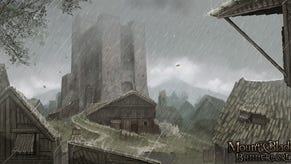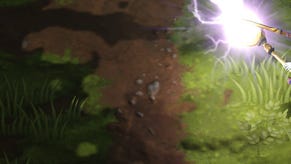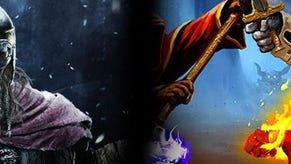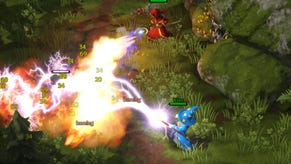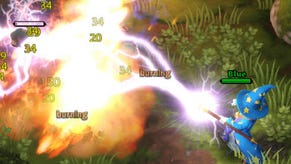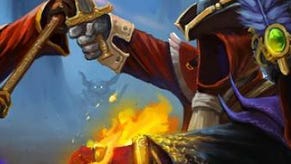Magicka: Wizard Wars: prepare for more friendly fire
Magicka: Wizard Wars is Magicka, but with a twist. How much of one? VG247's Stephany Nunneley picked the brains of Paradox North EVP John Hargelid and lead designer David Nisshagen to find out what has changed, and what has stayed the same.
Paradox North is a new studio within Paradox, headed up by former-DICE developer John Hargelid which also brought in former Age of Conan designer - and also a former DICE man - David Nisshagen as lead on the new Magicka title, so the team has the proper multiplayer background - and then some- to create a team-based multiplayer game set in the Arrowhead Games franchise.
Wizard Wars is a fast-paced, PvP, four vs four game based on the original game's PvP add-on only with a better infrastructure straight out of the gate. We all recall the growing pains inherent in the last game at launch, which Hargelid said the team plans to avoid this time out.
"There are over 2 million players who own Magicka and like the PvP experience, so we decided to create a dedicated game for that portion of our community based on the original game created by Arrowhead," Hargelid explained.
"We try to make sure the game is running in a crash-free state every Friday. We already have it running, and have for around six months now."
As you already noticed with the live-action trailer, Wizard Wars will contain the same humor and pop culture references Magicka players are used to, but at the same time, it will have a more serious tone to it in the sense that the wizards are embroiled in a civil war. A lurking evil, which was not expanded upon to me, is lurking and pitting the wizards against each other.
Like the previous Magicka, there are eight elements players will use to form different combinations. While the original game had around 40,000 different combinations, these have been scaled down in 1:1 situations in Wizard Wars. Even with less combinations available, there will still be plenty to counter the attacks doled out by your enemies making it more of a fighting game in one-on-one situations.
The game is being developed using a new engine which will also improve on the visual quality and new animations provide for smoother movements and more effects when it comes to attacks and the prerequisite friendly fire, as well as the overall customization of the wizards themselves. So in addition to the color of the wizard's robe, players can add antlers, necklaces, and all sorts of accessories while still maintaining the overall Magicka wizard look.
It will also contain NPCs, which with the game in pre-Alpha, neither Hargelid or Nisshagen could elaborate much on that aspect, but playtests are run on the game pretty much everyday.
"We try to make sure the game is running in a crash-free state every Friday," said Nisshagen. "We already have it running and have for around six months now, and with the new engine, we can find and solve any problems rapidly. It's only been in development for nine months."
For a game which has only been in development for such a sort amount of time, it's looking really good, especially from an animation standpoint. All characters can heal, do ranged and close combat damage, and the effects coming out of these moves didn't seem to slow the game down whatsoever.
With the gameplay, as with any fighting game, remembering the right combinations will be vital to your strategy as there isn't a pre-selected hero available as in most fighting games. There are no statistics - it's properly skill-based. No "I do more DPS therefore I win" scenarios.
Movement is also integral to Wizard Wars. In the original game, you moved to a point in the map, stood still, and cast your spell. This time out, you can hunt down your enemy on the run and cast your spells at the same time.
NPCs won't be mindless drones either. Players will be able to decide whether to use them as support, for healing or as a meat shield. They are there to help the player rather than just running around the game map, and used correctly, will help the teams when taking over the three control points on the map - which once taken over, become a respawn point for the team. A handy thing to have, indeed.
"The goal of the game is really simple: to kill all your enemies, and to do that, you need to take over all the respawn points," Nisshagen explained. "After this, you need to hunt down the remaining enemies on the map. However, even the last remaining enemy can recapture a respawn point, and bring back his entire team. It's not over until it's actually over - unlike other PvP games where you feel as though you lost 10 minutes ago or so, and keep playing just to earn your points.
"We're also going for shorter rounds, and aiming for something like 5-10 minutes roughly. Again, this helps avoid a 40 minute match where you already know who is going to win. Here you may feel that you are going to lose, but with Magicka, you can at any time turn the game around."
One of the biggest challenges in getting people to play the original Magicka, was finding people willing to keep track of shift clicks and control clicks - and what's the difference, right? That was the problem I, personally, had with the original as did Hargelid.
"I said to David, the only thing I want is the main eight elements and I want to be able to use only the mouse if I want to cast all the spells," he said. "So the solution was to select your combination, and right click. And if you right click on yourself, that means one thing. This makes it context sensitive and you no longer have to keep track of shift and control clicks anymore."
Now, when you click on yourself, that's self-cast. Click on an enemy, that's an attack. Click on the ground in front of you, you will then set up something else.
"I think I cried myself to sleep at night due to trying to reduce the complexity of Magicka's numerous spells down to the ones which were actually relevant," said Nisshagen. "Once I started removing redundancies, I was able to shrink things down to something more manageable, and and with balance. So where there were over 40,000 spells in the original game, there were many that players didn't use - they continued to use just the ones that won them the game.
"So when we streamlined the control scheme, we ended up landing on around 300-400 spells without losing any of the complexity. Just making it more accessible, and more relevant. Some may be a bit wonky, like I can combine fire and life and heal you while I set fire to you - but you may be frozen so there is a purpose with it."
Hargelid expanded upon the combinations, but saying that he himself had found issues with remembering certain combinations in the original game - a problem I had with it as well. Now, if you see a player charging up ice, you won't need to decide if you should counter with four fire and one stone. Instead you just choose your element and counter.
"When I played the first game, I thought I was fighting the controls as much as I was the enemy," Nisshagen said. "I loved the depth and complexity of the system, and I think we've been able to keep that, maybe even increase the depth, while giving the player more viable options."
This has not only made things easier for new players, but veteran player will be able to match up with players of their same skill level, so as not to be bothered playing with those less skilled, helping build a nicer community where players can play with others in the same skillset. Counter to this, the plan is also to put more skilled players with ones not as familiar with the game, so as to help lift them up and teach them rather than harass them - because that is a lose/lose.
"Right now we're staying on PC where Paradox is strong. It will be on Steam, and the enginewill allow us to bring it to other platforms if we feel it is the right thing to do."
The team also wants the current community involved in the process, which is why the game was announced as early as it was, so that fans of the original can voice their opinion or tell the team what they want as far as PvP is concerned, and respond to what players want to see going forward with development.
So far, development is only on PC, but the possibility of other platforms isn't off the table for the future.
"Right now we're staying on PC where Paradox is strong," said Hargelid. "It will be on Steam, and the engine the game uses will allow us to bring it to other platforms if we feel it is the right thing to do and to also go where I players want us to go."
He did say, though, that he has given Nisshagen the challenge of making the game's controls work on a controller - but at present, he only has ideas for it in his head and maybe on a piece of paper.
"The controls would just need to be streamlined for a console controller - it's not impossible, and it won't be up to the same speed, that you can have with PC, because there's just not enough buttons, but I think we'd have a good shot of making it playable on a console," said Nisshagen.
While this doesn't necessarily mean the team is looking to bring the game to consoles, it's just prudent to contemplate how this would be accomplished, especially with Steam boxes looming on the horizon.
"It is really exciting where everything is heading," said Nisshagen. "Not only because of being able to appreciate all the pretty graphics which come with PC gaming, and bypassing all the complexities of console updating, but we haven't seen [the Steam boxes] yet."
A release date hasn't been set, but once the online infrastructure is up to the team's standard, a release date should come not long after, and both Nisshagen and Hargelid seem really excited with not only the studio's first game, but Paradox North in general.
"I worked at Funcom for three years on Age of Conan and was one of the first designers on the project," said Nisshagen. "Then I went to DICE and spent a long time working on Battlefield Online, so I spent six years of my life working on projects where I wasn't able to be there from start to finish. With Paradox North, I am here from the start of the game, and I can actually interact with the community and get it involved.
"With triple-A, it sometimes takes three years to create a game, so from a designer's standpoint, you are creating a game where you have to imagine what you are creating will be fun to play three years from now. So, what do you do when one day you are like 'oh, sorry, I had the wrong idea two years ago -oops.' The duration time on ideas is just too slow.
"So it is much nicer to be working with a smaller team where when the community decides its wants something, we can do it. It really feels fantastic."
"For me it was just a great opportunity to start something from scratch," added Hargelid. "We are at 14 people now who are a great mix of great new talent as well as industry vets and Stockholm is a hotbed for new studios and talent at the moment, so it's all really exciting for me."




